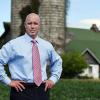Cape leaders call on county to enact assessment fee

On the day the governor signed the bill into law, the Cape school board unanimously approved a resolution calling upon Sussex County Council to enact a voluntary school assessment to address the impact of residential development on school capacity.
At the Sept. 14 school board meeting, Cape Director of Finance Oliver Gumbs said Gov. John Carney signed Senate Bill 186, which had passed the General Assembly June 30.
“This is a long time coming,” Gumbs said. “The growth comes with a cost. The cost has been hitting our taxpayers more than it could or should. With this legislation almost enacted and almost true, we will be able to start to collect those fees to help mitigate some of the costs for taxpayers.”
The bill, spearheaded by primary sponsor Sen. Russ Huxtable, D-Lewes, gives Sussex County the tool needed to enact a VSA to address the impact of residential development on school capacity.
Residential developers pay a VSA to the Department of Education on behalf of an impacted school district when the district lacks the capacity to serve additional students that result from new developments.
VSA funds are released to districts to help pay for construction projects that increase capacity, for minor capital improvements and to lessen the debt service.
“We know we don’t have capacity,” Gumbs said, nothing the district has struggled over the past seven years. “It’s difficult when you grow a school in two years.”
The VSA does not apply to low-income housing or senior communities, Gumbs said, and is voluntary because developers have the option of donating to the district a piece of land at fair market value.
“So you get land or you get money,” Gumbs said, noting that every school district in Sussex is adopting resolutions to send to the county. Gumbs said he would like to see the VSA enacted by the start of the next fiscal year, July 1, 2024.
When asked by board member Julie Derrick whether he was confident council would enact a VSA, Gumbs said he’s not confident until he sees it in writing.
“This is not a tax on our current county residents,” Gumbs said. “This is a fee on developers that they pass on to people buying homes who are moving here from outside Delaware. So this does not impact our local residents; it actually helps them by keeping costs down.”
Superintendent Bob Fulton said Sussex is the only county in Delaware that hasn’t enacted a VSA.
Fees are calculated annually, and the fee assessed to each development is good for five years, Gumbs said. He estimated, based on issued building permits, that the district could have collected $7.6 million in impact fees since Jan. 1, 2022.
“This would have been a significant help to our taxpayers, and this is what it’s really about,” Gumbs said.
School board member Janis Hanwell said the state school board association, state business managers and chief school officers have been working toward the implementation of the VSA for a long time, and it’s finally happening with the support of legislators.
“It’s about time,” she said, noting fellow board member Janet Maull-Martin called for the enactment of impact fees when she ran for election in 2019.
The move is overdue in Sussex County and will help keep kids safe, Derrick said. The district has been blessed to have community support when passing referendums, she said, but other county schools are not so lucky.
During public comment, Milton resident and retired landscape architect Jeffrey Seemans said he was beginning to lose hope the bill would ever come to fruition. Seemans has addressed county council regarding the lack of a fee in Sussex, and said he learned to never give up hope.
“I will walk barefoot through burning coals, and after I get through that stretch, I will crawl through broken glass to help you get this passed through Sussex County Council,” Seemans told the board. “I will do anything that I can to help you get this passed. It is a matter of equity. It affects so many people, especially so many seniors who have chosen to retire here.”
New Castle County has had a voluntary assessment fee since 1999, and Kent County since 2006, he said.
“It’s something that I just felt was totally unfair,” Seemans said.















































